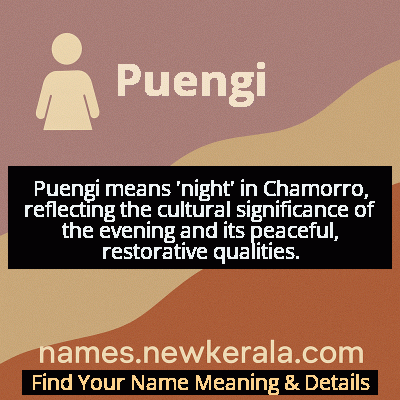Puengi Name Meaning & Details
Origin, Popularity, Numerology Analysis & Name Meaning of Puengi
Discover the origin, meaning, and cultural significance of the name PUENGI. Delve into its historical roots and explore the lasting impact it has had on communities and traditions.
Name
Puengi
Gender
Female
Origin
Chamoru
Lucky Number
9
Meaning of the Name - Puengi
Puengi means 'night' in Chamorro, reflecting the cultural significance of the evening and its peaceful, restorative qualities.
Puengi - Complete Numerology Analysis
Your Numerology Number
Based on Pythagorean Numerology System
Ruling Planet
Mars
Positive Nature
Generous, passionate, energetic, and humanitarian.
Negative Traits
Impulsive, impatient, moody, and can be overly emotional.
Lucky Colours
Red, maroon, scarlet.
Lucky Days
Tuesday.
Lucky Stones
Red coral, garnet.
Harmony Numbers
1, 2, 3, 6.
Best Suited Professions
Military, sports, philanthropy, leadership roles.
What People Like About You
Courage, energy, leadership, generosity.
Famous People Named Puengi
Puengi Taitano
Cultural Preservationist
Founded the Chamoru Language Revitalization Project in Guam, establishing community language nests for children
Puengi San Nicolas
Environmental Activist
Led successful campaigns to protect ancient Chamoru burial grounds and sacred sites from development
Puengi Chargualaf
Traditional Weaver
Master practitioner of Chamoru weaving techniques, preserving ancient patterns and teaching younger generations
Puengi Cruz
Educator
Developed the first comprehensive Chamoru language curriculum for Guam public schools
Name Variations & International Equivalents
Click on blue names to explore their detailed meanings. Gray names with will be available soon.
Cultural & Historical Significance
The cultural importance of Puengi extends to practical aspects of traditional Chamoru life. Before modern lighting, nights were governed by lunar cycles that dictated fishing, planting, and ceremonial activities. The name connects to ancient navigation traditions where Chamoru voyagers used star paths for inter-island travel. In contemporary Chamoru culture, Puengi represents resistance to cultural erosion and a reclaiming of Indigenous identity. During the Spanish colonization and subsequent American administration, many traditional names were suppressed in favor of Spanish and English names. The continued use of Puengi represents cultural resilience and the ongoing revitalization of Chamoru language and traditions in the face of historical challenges.
Extended Personality Analysis
Individuals named Puengi are often characterized by their deep intuition, calm demeanor, and reflective nature. Like the night they're named for, they possess a quiet strength and observational wisdom, often noticing details others miss. They tend to be introspective thinkers who process information deeply before speaking or acting, making them excellent problem-solvers and trusted advisors. Their natural rhythm often aligns with creative and spiritual pursuits, finding inspiration in quiet moments and solitude. Puengi-named individuals typically exhibit strong emotional intelligence and empathy, able to understand unspoken feelings and provide comfort during difficult times.
These personality traits often manifest in specific life patterns and career choices. Many Puengi-named individuals gravitate toward professions that require patience, observation, and deep understanding - such as counseling, research, artistic creation, or cultural work. They often serve as the 'anchor' in their social circles - stable, reliable, and offering perspective when others feel overwhelmed. While they may appear reserved initially, they form deep, lasting connections with those they trust, revealing layers of complexity and warmth like the gradual revealing of stars at dusk. Their strength lies in their ability to navigate emotional complexity with grace, much like the night encompasses both darkness and the brilliant light of stars and moon. This balanced nature makes them particularly effective in mediation roles and positions requiring diplomatic skill.
Modern Usage & Popularity
In contemporary times, Puengi remains a cherished name within Chamoru communities, particularly among families committed to cultural preservation. While not among the most common Chamoru names, it has seen a resurgence in recent decades as part of the broader Indigenous language revitalization movement. The name is primarily used in Guam and the Northern Mariana Islands, with some diaspora communities in Hawaii and California also choosing it for their children. Modern parents often select Puengi to honor their heritage and instill cultural values, appreciating its connection to nature and tradition. The name's usage reflects a growing pride in Chamoru identity and a rejection of colonial naming conventions that dominated the mid-20th century. Social media has helped spread awareness of traditional names like Puengi, with cultural influencers often sharing the meanings and significance behind such names. While statistical data on name popularity is limited for Chamoru names specifically, cultural organizations note increased interest in traditional names since the 1990s Chamoru cultural renaissance movement.
Symbolic & Spiritual Meanings
Symbolically, Puengi represents the mystery, protection, and renewal found in darkness. Like the night sky that conceals yet reveals celestial wonders, the name suggests hidden depths, intuition, and the uncovering of truths that only emerge in stillness. It symbolizes the protective embrace that allows for rest and regeneration, much like night provides sanctuary for dreams and healing. In Chamoru symbolism, night is not empty but full of potential - the time when seeds germinate underground, when visions come in dreams, and when the soul reconnects with ancestral wisdom. Puengi embodies the concept that some of life's most important work happens unseen, in the quiet spaces between activities. The name also carries the symbolism of transition and cycles, representing the necessary balance between activity and rest, speaking and listening, light and darkness in the complete human experience. This rich symbolic tapestry makes Puengi not just a name but a philosophical concept representing the essential, often overlooked aspects of existence that give depth and meaning to human life.

